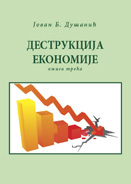| NSPM in English | |||
On the ruins of Yugoslavia |
 |
 |
 |
| субота, 18. април 2009. | |
|
NATO's aggression against Yugoslavia in March-June of 1999 (the whole operation mainly led by the U.S.) marked another step toward a managed world pattern. NATO made an attempt to use force against 'disobedient' states without UN sanctions and then watched the reactions of all European institutions and countries. In the Balkans NATO acquired not only big military experience and an opportunity to exhaust old and use new weapons but also managed to enhance its activities, making its way to a global organization. Ten years have passed since the NATO aggression against a sovereign European state. What did these years bring to those who threw bombs and those who were attacked? What goals did NATO pursue and whether it managed to cope with its tasks in the following years? I would like to make it clear in the very beginning that NATO did not achieve a military victory. They failed to destroy the army of Yugoslavia and tame the soldiers` morale. However, they got the right political atmosphere for destroying Serbia and, first of all, for imposing their conditions on the Serbian government, including the rules of cooperation with the EU, the International Criminal Tribunal for the Former Yugoslavia and with NATO. After the 1999 Serbia lost almost all opportunities to control its sovereignty and national security. After long years of injustice and punishment the Serbs lost the will to fight, to resist as they were practically alone when tried to repel the attack of the powerful Western military alliance. So, after 1999 it became easier for NATO to continue destruction of Yugoslavia and carry out power shifts. In 2000 Slobodan Milosevic, who had been ruling the country for quite many years, was ousted. At first sight, the move came as unexpected, easy and legal, in other words-Yugoslavia's home affair. In fact, it had been very thoroughly prepared by special divisions. The method proved to be so successful that it was later used in Georgia and Ukraine. The Georgian opposition were taught in Serbia, while their Ukrainian 'colleagues' were drilled also in Serbia and in Georgia. This is how they changed power in a country they had long failed to destroy. But Yugoslavia remained as a symbol of independence and disobedience. However, the new authorities obeyed and everything went smoothly. Having arrived in Belgrade in February 2003, Javier Solana suggested to a group of officials from Serbia and Montenegro to admit that the Federal Republic of Yugoslavia ceased to exist, and adopt the Constitution charter, written somewhere in Europe, its text proclaiming the appearance of a new country. Solana did not face any resistance. The Republic was renamed to the State Union of Serbia and Montenegro, and officially abolished the name ''Yugoslavia''. In 2006 Montenegro and Serbia declared independence, thereby ending the Yugoslav state. And it was Javier Solana who did it-he who remains a war criminal for Serbs, who bombed their country in 1999. After the 1999 it was easier to implement the plans which seemed fantastic under Milosevic. Yugoslavia was undermined, its integration slowed down, its strength exhausted. What they failed to achieve in Ramboia in 1998 and through the 1999 bombings, they got on July 18th, 2005, when Serbia and Montenegro signed a deal with NATO "On Lines of Communication". This is a technical agreement which allows NATO personnel and equipment to transit through the country. Under the deal, the Alliance could enjoy such opportunities for quite a long time- "until all peacekeeping operation in the Balkans are over". Thus NATO was given the green light to enlarge its presence in the region and control the army of Serbia and Montenegro. Today the Balkans are NATO's permanent base. In October 2008 Serbia's Defense Minister and NATO officials signed a deal on information security, which allows the Alliance control everyone who deals with their documents or just cooperates with them. They insisted on secrecy of the negotiations with Serbs. The aftermath of the 1999 aggression for NATO was the most favorable. Nobody condemned NATO and they felt even more confident. In recent years the world has witnessed NATO making several attempts of expansion. Currently the bloc is occupying its position on the Balkans, using old and building new camps. It ignores all demands to stop enhancing its security at the cost of others. The level of regional security on the Balkans is lowering, and, of course, Moscow is aware of this. NATO camp Bondsteel is being illegally operated in Kosovo. In the center of Skopje the U.S. is said to build an embassy, but its architecture is more likely to resemble a military base or a CIA office. Although NATO's role on the Balkans is officially described as a peacekeeping mission, it is not a secret to anyone that the Alliance deals with suppression of the Balkan Slavs. The process yet is not over. We can see this happening in Kosovo and Metohija, Bosnia and Herzegovina, Macedonia, Serbia (Vojvodina, Sandjak and southern provinces). In February 2008 Kosovo received Washington's permission to proclaim its independence. It happened later than expected due to the positions of Russia,China and some other states. At the Security Council Moscow said 'no' to Kosovo`s independence. Russia respects interests of Serbia and condemns all attempts to impose decisions on other members of the international community. Russia understands that if extremism is not stopped, Macedonia and then Montenegro will have to say goodbye to a part of their territories. Europe will have to decide how to discuss the issue of borders revision and how to recognize a new enlarged state of Albania or the enlarged and independent Kosovo. Russia seems to have found enough strength to stop being a mere observer, as this role undermines its national security. Moscow gives it to understand it is going to help the nations which confide their future to Russia. Only Russia may bring stability to the Balkans. The Serbian authorities should not miss the chance. They must remember that Vojvodina is in jeopardy, that new rebellions are very likely in southern Serbia. |
Од истог аутора
Остали чланци у рубрици
- Playing With Fire in Ukraine
- Kosovo as a res extra commercium and the alchemy of colonization
- The Balkans XX years after NATO aggression: the case of the Republic of Srpska – past, present and future
- Из архиве - Remarks Before the Foreign Affairs Committee of the European Parliament
- Dysfunction in the Balkans - Can the Post-Yugoslav Settlement Survive?
- Serbia’s latest would-be savior is a modernizer, a strongman - or both
- Why the Ukraine Crisis Is the West’s Fault
- The Ghosts of World War I Circle over Ukraine
- Nato's action plan in Ukraine is right out of Dr Strangelove
- Why Yanukovych Said No to Europe

.jpg)








 At the end of the 20th century the fate of Yugoslavia was being determined by numerous international organizations rather by Yugoslavs. The nation did not want to obey and was punished. In 1992-1995 they were forced to accept ultimatums and support military offensives. The aforesaid organizations launched information wars, established coalitions and alliances and imposed peace deals in Dayton and Ramboia. Nowadays there is hardly anyone on the post-Yugoslavia territory who could oppose to such policies.
At the end of the 20th century the fate of Yugoslavia was being determined by numerous international organizations rather by Yugoslavs. The nation did not want to obey and was punished. In 1992-1995 they were forced to accept ultimatums and support military offensives. The aforesaid organizations launched information wars, established coalitions and alliances and imposed peace deals in Dayton and Ramboia. Nowadays there is hardly anyone on the post-Yugoslavia territory who could oppose to such policies.












